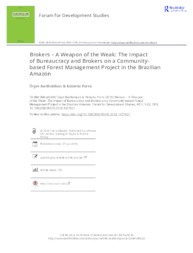Brokers - a weapon of the weak: the impact of bureaucracy and brokers on a community-based forest management project in the brazilian Amazon.
Brokers - a weapon of the weak: the impact of bureaucracy and brokers on a community-based forest management project in the brazilian Amazon.
Author(s): BARTHOLDSON, Ö.; PORRO, R.
Summary: The bureaucracy that regulates land tenure, agriculture and community-based forest management (CBFM) in the Brazilian Amazon aims at achieving an impartial administration and process of practices that complies with the intention of laws, regulations and decrees and safeguards the rights of the citizens at large and particularly people in a vulnerable position. Yet the local power-holders? actual interpretation and implementation of laws, regulations and decrees is to large extent opaque, arbitrary and contingent upon subjective intentions, interests and perspectives. These irregularities and arbitrariness affect poor smallholders hard and hamper their access to resources and formal rights. This paper intends to show how the smallholders who have initiated a CBFM project in a settlement in the north-eastern region of the Brazilian Amazon are unable to manage the project on their own, because they lack financial capital, as well as the necessary social and political capital to be able to obtain compulsory permits and make the contracted firm and people comply with the terms of the contracts. In order to transcend these difficulties, the smallholders utilize their social networks, above all vertical contacts, to attract brokers. The paper argues that this strategy assigns great power and influence to various brokers, and affects how policies are implemented, how resources are distributed or not distributed and how power relations are articulated. These aspects of governance and governmentality are grossly under-theorized in research on development projects in general and CBFM in particular. The paper is based on participant observation and various forms of interviews, carried out in 2012?2017.
Publication year: 2019
Types of publication: Journal article
Unit: Embrapa Eastern Amazon
Keywords: Amazonia, Burocracia, Desmatamento, Manejo, Manejo florestal comunitário
Observation
Some of Embrapa's publications are published as ePub files. To read them, use or download one of the following free software options to your computer or mobile device. Android: Google Play Books; IOS: iBooks; Windows and Linux: Calibre.
Access other publications
Access the Agricultural Research Database (BDPA) to consult Embrapa's full library collection and records.
Visit Embrapa Bookstore to purchase books and other publications sold by Embrapa.

